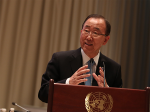 19 July 2016: Thirteen governments gave the first-ever Voluntary National Reviews, reporting on efforts to implement the 2030 Agenda for Sustainable Development in their countries. The VNR presentations began on the second day of the High-Level Political Forum on Sustainable Development (HLPF) Ministerial Segment. The reports – provided by Mexico, Morocco, Switzerland, Montenegro, Sierra Leone, Norway, Madagascar, Georgia, Turkey, Finland, Samoa, Uganda and Germany – emphasized the need to: modify existing national economic and development planning processes; engage different government departments and broader technical expertise; develop indicators and collect data; and ensure high-level leadership.
19 July 2016: Thirteen governments gave the first-ever Voluntary National Reviews, reporting on efforts to implement the 2030 Agenda for Sustainable Development in their countries. The VNR presentations began on the second day of the High-Level Political Forum on Sustainable Development (HLPF) Ministerial Segment. The reports – provided by Mexico, Morocco, Switzerland, Montenegro, Sierra Leone, Norway, Madagascar, Georgia, Turkey, Finland, Samoa, Uganda and Germany – emphasized the need to: modify existing national economic and development planning processes; engage different government departments and broader technical expertise; develop indicators and collect data; and ensure high-level leadership.
Mexico reported that it has: established a specialized technical committee to monitor and implement the Sustainable Development Goals (SDGs); created a national online platform to share best practices, policies and technological advances; and plans to create a high-level commission for SDG implementation, headed by the President and including academia and civil society.
Morocco outlined its: national plan for industrial development; Green Morocco Plan on agriculture; renewable energy programme; green tourism strategy for 2030; gender equality project; and housing and economic assistance programme.
Switzerland highlighted five elements of the Swiss action plan: commitment at the highest political level; partnerships across levels of governments and with stakeholders; coherence and coordination; a sustainable development monitoring system; and mobilization of resource and international assistance.
Sierra Leone said his country had: published a simplified version of the SDGs; engaged in “sensitization” activities; aligned the SDGs with Sierra Leone’s Agenda for Prosperity and the national budget; and drafted country-specific indicators.
Norway highlighted: that each ministry is analyzing SDGs and targets within its area of responsibility; annual progress reporting; efforts to ensure high-quality education for all; and participation of indigenous peoples and civil society as key elements of the country’s 2030 Agenda implementation.
Madagascar described: an institutional framework to implement the SDGs; direct initiatives to achieve equity, fairness and non-exclusion, including a social protection policy; and efforts to develop a national resource mobilization strategy.
Georgia highlighted: a Joint Technical Working Group for the SDGs, with experts from line ministries and the National Statistics Office; prioritization of 14 SDGs; and integration of the SDGs into the Annual Governmental Work Plan. During the ensuing discussions, Maldives said prioritization does not undermine the universality and indivisibility of the goals. Turkey described efforts to embed the SDGs into its upcoming national 11th Development Plan, and indicated its plans to strengthen the Sustainable Development Coordination Commission and update existing indicators.
Finland stated that the country’s Sustainable Development Coordination Secretariat is managed by the Prime Minister’s office, and the sustainable development strategy and development policy were updated in 2016 in line with the 2030 Agenda.
Samoa explained it conducted a consultative assessment of its 2012-2016 development strategy against the SDGs, which forms the basis for its 2016-2020 development strategy, and has produced national indicators.
Uganda said its second development plan will focus on the agriculture, tourism and mineral sectors. Germany highlighted: taking all aspects of the SDGs into account and accounting for impact of actions beyond national borders; and strategies to reduce Germany’s ecological footprint, including national strategies for biodiversity and sustainable consumption.
During ensuing discussions, participants addressed, inter alia: efforts to achieve a circular economy and bio-economy as ways to reduce the national ecological footprint; and the key role of civil society in national development planning and implementation processes.
In addition to the VNRs, the second day of the Ministerial Segment also included a special address by UN Secretary-General Ban Ki-moon. Ban outlined the main messages from the first progress report on the SDGs. He also described the VNRs as a key feature of the HLPF, pledged the UN’s full support in implementing the 2030 Agenda, and noted the need to improve the quality of official development assistance (ODA). Finally, Ban called on Member States to ratify the Paris Agreement on climate change, and “pledge never to rest” until a world of peace, dignity and opportunity is achieved for all.
The 2016 session of the HLPF is convening from 11-20 July 2016, at UN Headquarters in New York, US, with the Ministerial Segment running from 18-20 July. The Ministerial Segment will conclude on 20 July with the remainder of the 22 VNR presentations, a discussion on “prospects for the future,” and the completion of the General Debate. [UN Meeting Summary] [UN Secretary-General Statement] [IISD RS Coverage of HLPF 2016] [HLPF 2016 Website] [UNISDR Press Release]